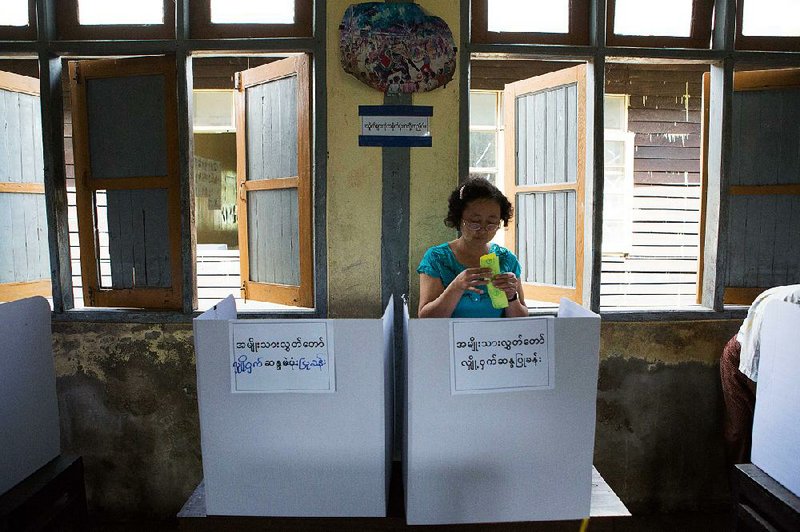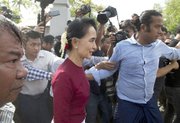RANGOON, Burma -- Officials across Burma counted votes today after an election that supporters of opposition leader Aung San Suu Kyi's party expect to win easily, but the road to forming a government remains filled with hurdles.
"DAWN OF A NEW ERA. Millions vote in historic election," was today's banner headline of New Light of Myanmar, a government-owned newspaper.
Sunday's vote was billed as the freest ever in the Southeast Asian nation, which has been run by a quasi-civilian government for the past five years in a scripted transition toward democracy. The military gave up its half-century rule in 2011.
Many of the 32 million eligible voters cast ballots for the first time, including Suu Kyi, the epitome of the democracy movement.
"I'm really happy because from what I heard the [National League for Democracy] is winning. I couldn't sleep until 11 or 12 because I was looking everywhere for results," said San Win, a 40-year-old newspaper vendor.
"Things will change. If it does, Mother Suu will do her best for the country," said Tun Khin, another vendor, referring to Suu Kyi with the affectionate term that many in Burma use.
Suu Kyi supporters danced in the rain outside her party's Rangoon headquarters Sunday, anticipating victory over the military-backed ruling party.
Ballots are being counted at the tens of thousands of polling stations across the country, and results will be relayed by party representatives to their headquarters, where a master tally will be kept. The results will also be sent to the central election commission, which will announce them today as they arrive.
Wearing her trademark thazin flowers in her hair, a smiling Suu Kyi arrived at the polling station near her lakeside residence, where she was mobbed by hundreds of journalists. She quickly cast her vote and left without speaking to reporters.
Suu Kyi told a crowd gathered today at the National League for Democracy party headquarters that the results won't be announced soon, "but I think you all have the idea of the results."
"I want to remind you all that even candidates who didn't win have to accept the winners, but it is important not to provoke the candidates who didn't win to make them feel bad," she said.
Many people lined up in Buddhist temples, schools and government buildings early in the morning to vote, well before a heavy downpour beat down in Rangoon an hour before voting ended peacefully in the late afternoon with no reports of major irregularities or violence.
Election monitors called it "a remarkable day" full of excitement and energy.
Among the voters braving long lines at polling stations, there was a sense of jubilation at taking part in what many described as the first genuine election in their lives.
"We've been suppressed for a very long time by the government," said U Saan Maw, 63, who voted on Sunday and made sure his friends and family did, too. "This is our chance for freedom."
Although more than 90 parties were contesting the elections, the main fight was between Suu Kyi's National League for Democracy and the ruling Union Solidarity Development Party, made up largely of former junta members. Parties from ethnic minority groups, which represent 40 percent of Burma's 52 million people, were also running.
"I think the country will be better if the party we chose or the leader we chose actually becomes the leader," said first-time voter Myo Su Wai. "I'm voting for NLD. That's my choice."
The election will not bring full democracy to the nation. Burma's constitution guarantees 25 percent of seats in parliament to the military and was rewritten to keep Suu Kyi, the country's most popular politician, from the presidency.
Yet those who voted Sunday said they felt a thrill knowing that their country might be guided by the will of the people after so many years of military domination. .
"This is the first time I have voted," said U Okkar Oo, a betel-nut seller on a street corner in Rangoon. "Of course I am excited."
Okkar Oo entertained passers-by with a song, "Mama has to win!" It was an ode to Suu Kyi.
Suu Kyi is the daughter of the country's independence hero, Aung San, who was assassinated just as the country was emerging from British colonial rule.
U.S. Secretary of State John Kerry, in a statement Sunday, congratulated the people of Burma for working together "to hold a peaceful and historic poll," although he recognized that the elections "were far from perfect" because of such impediments to full democratic government such as reserving large numbers of unelected seats for the military; denying voting rights to certain minority groups, including the Muslim Rohingya; and disqualification of certain candidates.
Still, he said, "Millions of people from around the country, many of whom were voting for the first time, seized this opportunity to move one step closer to a democracy that respects the rights of all -- a testament to the courage and sacrifice shown by the people of Burma over many decades. "
Kerry expressed hope that the election will move Burma a step closer to democracy.
After taking power in 1962, the junta first allowed elections in 1990, which Suu Kyi's party won overwhelmingly. A shocked army refused to seat the winning lawmakers, with the excuse that a new constitution first had to be implemented -- a task that ended up taking 18 years amid intense international pressure. New elections were finally held in 2010, but they were boycotted by the opposition, which cited unfair election laws.
The Union Solidarity Development Party won by default and took office in 2011 under President Thein Sein, a former general who began political and economic changes to end Burma's isolation and jump-start its moribund economy. But the Union Solidarity Development Party's popularity, or lack of it, was tested in a 2012 by-election in which the National League for Democracy won 43 of the 44 parliamentary seats it contested.
Suu Kyi couldn't vote in any of those elections because she was under house arrest or there was no election in her residential area. But she did win a seat in parliament in the by-election.
Thein Sein said before the vote that the military and the government would accept the outcome should the ruling party lose and work with the opposition to ensure a stable transition.
"I want to urge people to leave their differences prior to the election aside and march forward in unity," Minister of Information Ye Htut wrote in a Facebook post after the vote. He didn't mention how he thought his ruling party had fared.
Asked by the Irrawaddy online magazine what he would do if his party lost, Thein Sein said: "I have to accept it as it is. ... Whatever it is, we have to accept our voters' desire. Whoever leads the country, the most important thing is to have stability and development in the country."
Even if Suu Kyi's party secures the highest number of seats in the bicameral legislature, it will start with a disadvantage because of the reserved places for the military in the 664-seat parliament.
This means in theory that the Union Solidarity Development Party, with the military's support, need not win an outright majority to control the legislature. To counter that scenario, the National League for Democracy would require a huge win.
That may not be far-fetched, given Suu Kyi's popularity.
After the polls, the newly elected members and the military appointees will propose three candidates, and elect one as the president. The other two will become vice presidents. That vote won't be held before February.
Suu Kyi cannot run for president or vice president because of a constitutional amendment that bars anyone with a foreign spouse or child from holding the top jobs. Suu Kyi's two sons are British, as was her late husband.
But Suu Kyi has repeatedly said she plans to lead the government should her party win, a stance that risks antagonizing the military. "I will be above the president," she said Thursday at her home in Rangoon, where she spent a total of 15 years under house arrest, ending in November 2010. "The constitution says nothing about someone being above the president."
The military is also guaranteed key ministerial posts -- defense, interior and border security. It is not under the government's control and could continue attacks against ethnic groups. But critics are most concerned about the military's constitutional right to retake direct control of government, as well as its direct and indirect control over the country's economy.
Richard Horsey, a Burma analyst, said that given the powers it has, the military will not be too perturbed about allowing a transfer of power to the National League for Democracy if it wins.
"But that's not to say the relationship between the new administration and the military will necessarily be a strong one," he said. "It's very difficult to imagine that anyone will be running the country without having the support of the military."
There are concerns also about the vote's credibility, because for the first time, about 500,000 eligible voters from the country's 1.3 million-strong Rohingya Muslim minority group were barred from casting ballots. The government considers them foreigners even though many have lived in Burma for generations. Neither the National League for Democracy nor the Union Solidarity Development Party fielded a single Muslim candidate.
Abdul Melik, a 29-year-old Rohingya, spent election day watching other people vote. He stared out from a camp on the outskirts of western Rakhine state's capital, Sittwe, where the Rohingya are forced to live in squalid camps and can't leave without official approval.
"I can see the Buddhist Rakhine, the Kaman Muslim and Hindus voting at a polling station close to the barricades," he said in a telephone conversation. "We were hoping that somehow we'd be allowed to vote. But today I have lost hope of any change in my lifetime."
"This is the day that hope ends," he added.
Information for this article was contributed by Vijay Joshi, Esther Htusan, Robin McDowell, Grant Peck, Denis Gray, Jerry Harmerk, Jocelyn Gecker and Min Kyi Thien of The Associated Press; by Thomas Fuller of The New York Times; and by Chris Blake and Kyaw Thu of Bloomberg News.
A Section on 11/09/2015

